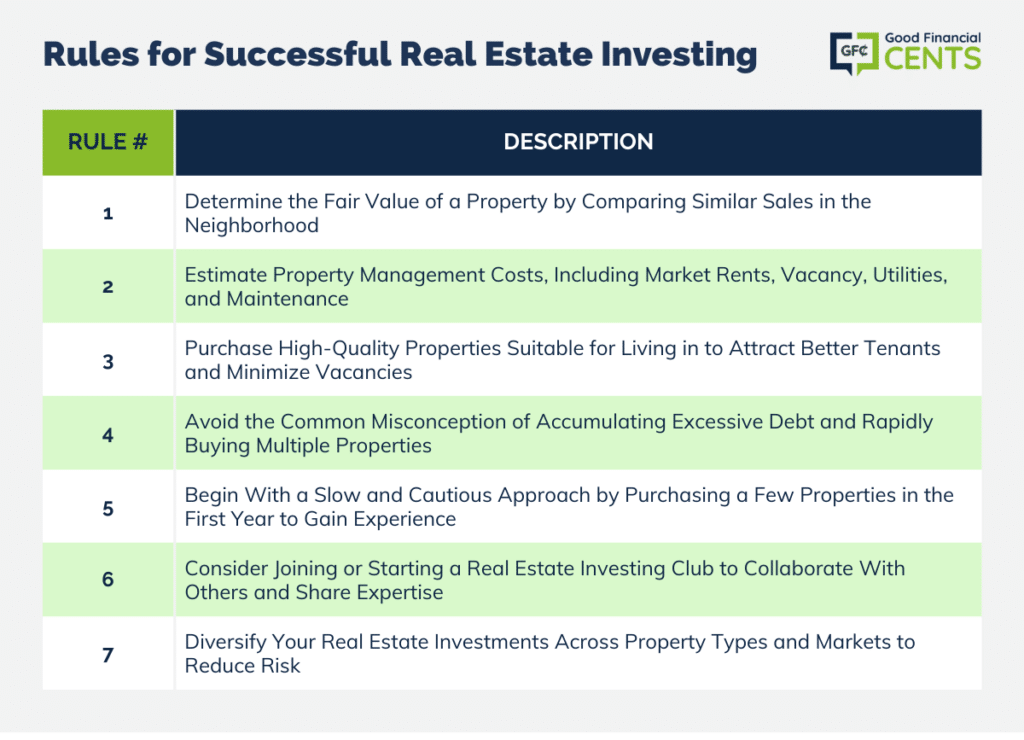The following is a real-life story submitted by a fellow blogger.
Creating long-term wealth in real estate investing is about understanding the rules and not going broke.
I had owned seven houses by the time I was 24 years old. I was all-in on the dream of real estate riches and driving a Porsche Boxster. I was pulling in almost six figures a year from rent and a full-time job.
Two years later, I was broke.
That’s why I can relate to Jeff’s story of the lessons he learned investing in real estate. He learned very quickly some real estate riches are too good to be true.
I still believe wholeheartedly in the power of real estate as a long-term generator of wealth.
I haven’t quite built my real estate empire back to its former glory, but I’ve created a consistent source of cash flow that will grow over time.
If you’ve ever dreamed of starting in real estate investing and making millions in property, you need to avoid the scams and myths sold by infomercial salesmen.
You need to understand the seven real estate rules that will create long-term wealth.
Table of Contents
How I Got Started in Real Estate
I started as a commercial real estate agent during my third year of college.
I had always been drawn to stories of real estate riches by developers like Sam Zell and Donald Trump. I loved the idea of taking a piece of raw land or a building and turning it into a cash register.
Selling commercial real estate was only the beginning. I wanted to be a developer, an investor, an owner.
The market for commercial properties had yet to rebound in 2002, but the residential market was booming. I saw the promise of fast appreciation and easy money through financing and decided to make the switch.
I started buying single-family houses with 10% down on money I saved while serving in the Marine Corps and when I got my first job in corporate finance. I focused on… ‘inexpensive neighborhoods’ where I could buy run-down properties for half the price I’d have to pay in nicer parts of town.
I figured I could still get decent market rents on houses that cost ten or twenty grand less, so the returns would be larger.
That would end up being my first mistake.
But I was hungry, so I busted my butt fixing up properties, refinancing to cash out on the improved value, and putting the money into another property.
I was going to be rich.
My Real Estate Empire Starts to Crumble
In the space of three years, I built up to six properties, plus my own home. At one point, I estimated my properties at just over half a million dollars, with about a fifth of it in equity.
Maybe I wasn’t rich by some definitions, but it wasn’t bad for a 24-year-old just out of college.
Then everything started to fall apart.
My six rental properties were producing consistent cash flow, but only because I was doing most of the work myself. I was my own electrician, painter, and property manager. You get the idea.
The Des Moines market is fairly small, and it’s difficult to find a property manager to handle single-family properties.
I found a few companies, but all wanted to charge upwards of 15% on the gross rental income. This would have meant paying out almost all the cash flow from the properties since mortgage payments ate up most of the rent.
Property management was out, so I was stuck doing it myself, along with juggling a full-time job and night classes for my master’s degree.
The downside to less expensive properties on the other side of the tracks was constant tenant headaches, complaints by city housing inspectors when the properties were abused, and missing work evicts a tenant in court.
I started neglecting my properties.
Like a stock investor in a bear market, I avoided even thinking about my houses. When a tenant moved out or evicted, the property might sit vacant for a month before I spent the week necessary to remodel it and get it back on the market.
Empty houses meant I was paying out-of-pocket to cover the mortgage payments, and it couldn’t last.
I started missing loan payments and destroyed my credit score. That meant no more refinancing and no more easy money from the bank.
Burned out and completely disillusioned, I started selling properties for whatever I could get.
It was 2006, and the market was starting to drop out of the real estate bubble, so sometimes it meant selling a house just to pay off the mortgage.
Real Estate Investing Myths I Learned the Hard Way
I still own a couple of rental properties and believe in the long-term value of real estate investing. Unfortunately, there are a lot of myths out there, too many 3 a.m. infomercials selling hot strategies to get rich quickly.
First, real estate is not a get-rich-quick investment.
The real stories of real estate riches are created over decades, even generations. Donald Trump’s father was already a successful real estate developer, and Sam Zell has been managing properties since the early 1960s.
That’s a solid return but not something that’s going to make you a millionaire overnight.
The only people getting rich quickly in real estate investing are those selling the strategies to unsuspecting investors.
Another myth in real estate investing is that it’s a cash register, just ring the bell and watch the cash flow.
In fact, most of your return is in the tax advantages and long-term appreciation of properties. If you’re leveraging your properties with debt, then the majority of your rents are eaten up by mortgage payments and property management.
You might be able to hire a property manager, turning your properties into passive income, but this is out of the question for a lot of individual investors. There just isn’t enough cash flow during the early years of growing your real estate empire to afford professional management.
7 Rules to Do Real Estate Investing (The Right Way)
Few investments have created as much family wealth as real estate, but it’s easy to fall for the myths and scams. Making money with rental properties, I mean creating real assets that will make you long-term rich, means avoiding these myths.

Real Estate Rule #1 – The first thing you need to do is learn how to find the fair value of a property before you buy it. Any investment can be a good deal for the right price, but it’s not always easy to find that price for real estate.
- Find at least five similar houses that have sold within the last year in the same neighborhood. You can usually find this through the county assessor’s office or through sites like Zillow.
- Divide the sales price of sold houses by their square feet and then average the number.
- Multiply this average price per square foot by the living space for the property you want to buy for a fair value estimate of how much it’s worth.
Real Estate Rule #2 – Estimate how much managing the property is going to cost down to every detail.
This means averaging out market rents in the area, deducting for vacancy and property management. Until you get a good idea of other costs like utilities and maintenance, be conservative with your estimates.
- Prepare three estimates of your cash flow for each property. One estimate should calculate all costs at the worst-case scenario, the highest you think they could be over a given year.
- Be realistic about the time you’re able to put into managing your own properties. Consider building in at least part-time help with maintenance or management.
Real Estate Rule #3 – Buy only quality properties in which you’d be comfortable living. You’ll get better tenants and will have fewer vacancies. You never know if things don’t go as planned, you might end up living in one of your rentals.
Real Estate Rule #4 – The 3 a.m. infomercials will tell you the secret to real estate riches is to put on as much debt as possible and buy as many houses as quickly as possible.
This strategy makes for exciting PowerPoint presentations but only leads to burnout and bankruptcy.
Real Estate Rule #5 – Take it slow, buying a couple of houses in your first year and getting a feel for how much it takes to manage real estate. You’ll build a long-term business and avoid getting in over your head.
Real Estate Rule #6 – Consider joining or starting a real estate investing club along with other property owners. This has helped me immensely while rebuilding my fledgling empire.
- Find other property investors through real estate agents, contractors, and online.
- Try to find people with skills in different aspects of real estate, from agents to contractors, lawyers, and property managers. Putting your skills together means everyone doesn’t have to be an expert in everything.
- There are different ways to set up the group, from formal associations where you pool your money for investments to informal groups where you simply trade ideas and help each other with services.
Real Estate Rule #7 – Finally, diversify your real estate investments as much as possible.
The cost of a single property means many individual investors are stuck owning one property type in one market. That means all the risk of a downturn in the type of real estate or within the local market.
- Buy different property types, including residential, office, storage, leisure, and warehouse.
- Buy in different markets across the United States if possible.
- One way to diversify your direct real estate portfolio is through owning REITs or real estate crowdfunding, which allows you to buy an equity position with a few thousand rather than tens of thousands.
Like any investment, real estate can make you wealthy if you know how to avoid the biggest traps.
- Being a long-term investor in property is about understanding the rules that will keep you from losing your money like I did. Don’t let the story keep you from following your real estate dreams, though. I still invest in rental properties and will be rich again, someday.

Joseph Hogue worked as an equity analyst and an economist before realizing being rich is no substitute for being happy. He now runs five websites in the personal finance and crowdfunding niche, makes more money than he ever did at a 9-to-5 job, and loves building his work-from-home business.
Final Thoughts – 7 Rules I Learned After Going Broke in Real Estate Investing
Joseph Hogue’s experience in real estate investing offers important lessons for those looking to get started.
First, he learned that real estate isn’t a quick way to get rich; it takes time and patience.
Second, making money from rental properties isn’t as easy as it seems; you need to understand tax benefits and property value growth.
Third, generating passive income in real estate isn’t immediate, especially in the beginning.
Hogue’s seven rules for successful real estate investing provide practical advice. They stress the importance of thorough research, careful financial planning, and choosing good properties.
Avoiding excessive debt and taking a gradual approach is crucial. Joining investment groups and diversifying across different property types and locations are also essential.
Following these rules helps reduce risks and achieve long-term financial goals in real estate.








These programs are no good if you owe more for your home than it’s worth, therefore no equity. But that’s not brought in the begining!
Still painful sharing the story but hopefully it will help others avoid the same mistakes in real estate investing. Thanks for the opportunity!